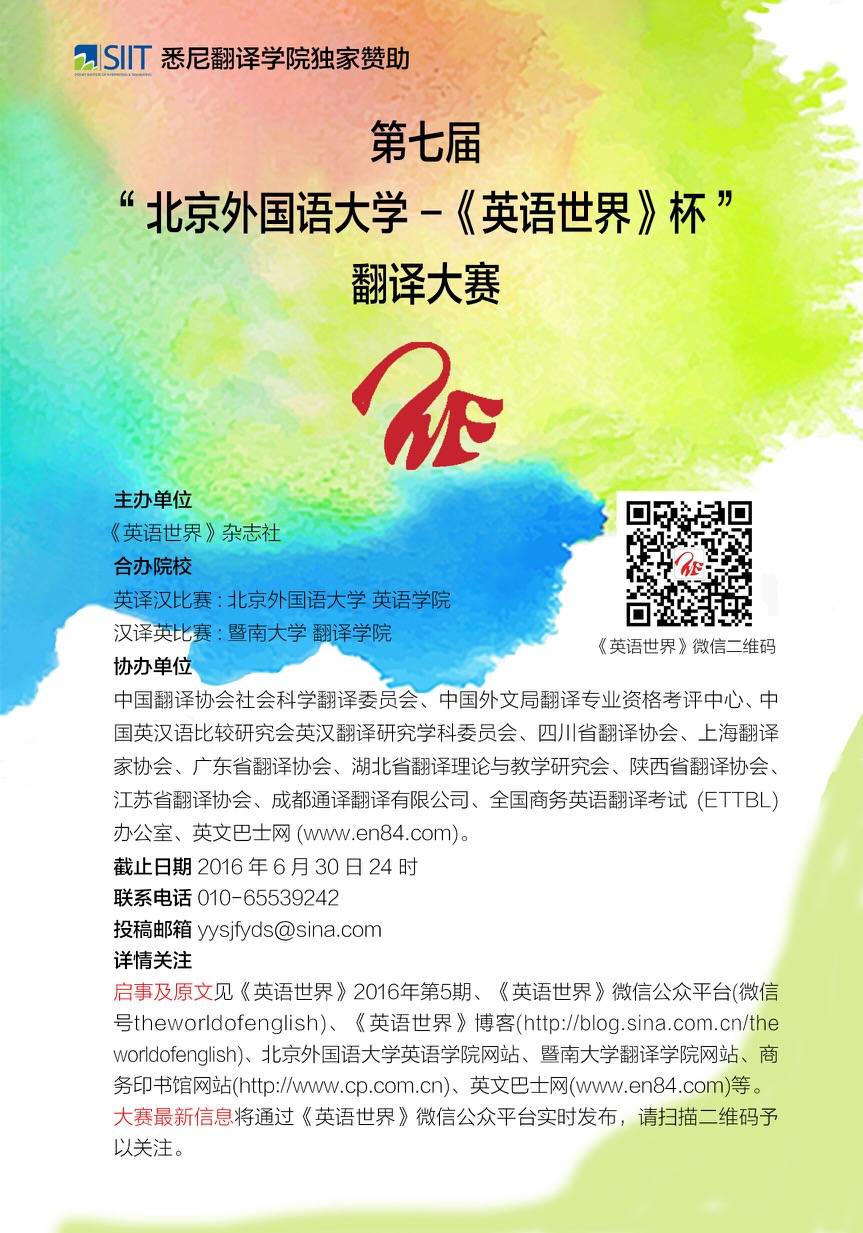
“《英语世界》杯”翻译大赛肇始于2010年,由商务印书馆《英语世界》杂志社主办。短短数载,大赛参赛人数屡创新高,目前已经成为国内最有影响的翻译赛事之一。为推动翻译学科进一步发展,促进中外文化交流,我们秉承“给力英语学习,探寻翻译之星”的理念,于2016年继续举办第七届“《英语世界》杯”翻译大赛,诚邀广大翻译爱好者积极参与,比秀佳译。
第七届“《英语世界》杯”翻译大赛得到北京外国语大学的大力支持,并由该校冠名本届比赛。2016年我们首次推出“汉译英”比赛,以响应当前社会对汉译英与日俱增的需求;我们还开启与知名外语院校合办翻译大赛的模式,将初评交给合办院校的老师,以提升大赛的权威性和公信力。复评和终评我们将延续历届传统,从全国范围内延请知名翻译专家进行评审。
合办院校
英译汉比赛:北京外国语大学 英语学院
汉译英比赛:暨南大学 翻译学院
协办单位
中国翻译协会社会科学翻译委员会、中国外文局翻译专业资格考评中心、中国英汉语比较研究会英汉翻译研究学科委员会、四川省翻译协会、上海翻译家协会、广东省翻译协会、湖北省翻译理论与教学研究会、陕西省翻译协会、江苏省翻译协会、成都通译翻译有限公司、全国商务英语翻译考试(ETTBL)办公室、英文巴士网(www.en84.com)。
赞助单位
本届大赛由悉尼翻译学院独家赞助。悉尼翻译学院成立于2009年,是在澳大利亚教育部注册的一家专业翻译学院。学院相关课程由澳大利亚翻译认证管理局(NAATI)认证。该院面向海内外招生,以构建“一座跨文化的桥梁”为目标,力图培养具有国际视野和跨文化意识的涉及多语种的口笔译人才。
赛 程
1. 2016年5月前发布大赛启事及原文,10月前公布获奖结果,见诸以下媒体:《英语世界》2016年第5期(启事及原文)和第10期(获奖结果等)、《英语世界》微信公众平台(微信号:theworldofenglish)、《英语世界》博客(http://blog.sina.com.cn/theworldofenglish)、北京外国语大学英语学院网站、暨南大学翻译学院网站、商务印书馆网站(http://www.cp.com.cn)、英文巴士网(www.en84.com)等。
2.参赛投稿截止时间:2016 年6月30日24时。
3.大赛各项最新进展将通过《英语世界》微信公众平台实时发布,请予关注。
参赛要求
1.参赛者国籍、年龄、性别、学历不限。
2.参赛译文须独立完成,不接受合作译稿。
3.仅第一次投稿有效,不接受修改后的再投稿件。
4.本届翻译大赛只接受电子版投稿,不接受纸质投稿。
5. 在大赛截稿之日前,请妥善保存参赛译文,勿在报刊、网络等任何媒体上或以任何方式公布,违者取消参赛资格并承担由此造成的一切后果。
6.参赛译文一经发现抄袭或雷同,即取消涉事者参赛资格。
7.参赛者投稿即视为其本人同意和自愿遵守本启事的各项规定。
奖项设置
1.翻译大赛“英译汉”和“汉译英”每组拟分别设置一等奖1名,二等奖2名,三等奖3名,优秀奖若干名。
2.一、二、三等奖颁发证书、奖金和奖品,优秀奖颁发证书和奖品。
3.所有获奖者均获赠2017年《英语世界》杂志一套(1-12期),并有机会受邀成为《英语世界》的译者。
4.积极组织学生参加翻译大赛的院校,颁发“优秀组织奖”证书;获奖院校有机会成为“《英语世界》翻译实践基地”合作单位。
5.入围复审名单的参赛者,应本人要求可由本社开具“入围复审”的书面证明。
参赛费用
1.为应对不断攀升的评审成本,提高奖励额度,遏制少数人敷衍投稿的行为,本届大赛酌情收取少量、不至给参赛者造成较大负担的参赛费,以保障大赛良性开展。恳请参赛者谅解为盼。
2.单独参加“英译汉”或“汉译英”其中一项比赛缴纳参赛费30元,两项均参加缴纳参赛费60元。不缴纳参赛费的稿件无法进入评审程序。大赛开通各种便捷支付方式见下。
3.微信支付,添加我刊微信公众号(theworldofenglish),通过微信菜单进入我刊微店,拍下“翻译大赛参赛费”的商品完成支付。
4.支付宝支付,接受支付宝注册账户间直接转账,请转账至我社支付宝账户:934823621@qq.com。
5.银行转账,直接转账到我社账户,单位名称:《英语世界》杂志社有限公司;开户银行:中国工商银行北京祥普支行;账号:0200096009000015626 。
6.邮局汇款,收款人:《英语世界》杂志社有限公司;汇款地址:北京朝阳门外大街吉庆里9号楼E-2-1005 (邮编100020)。
7.各种支付方式请务必在留言或附言栏写明“XXX(姓名,下同)参赛费”。投稿姓名无法在支付时所留姓名中查到者,所投稿件无法进入评审程序。
8.入围大赛复审名单者,个人参赛费将予以退还;未入围复审名单者,个人参赛费概不退还。
投稿规范
1.参赛译文及个人信息于截稿日期前以附件形式发送至电子邮箱:yysjfyds@sina.com 。
2.邮件主题:根据本人参赛类别选择“XXX英译汉”“XXX汉译英”或 “XXX英译汉和汉译英”。
3.个人信息:文件名“XXX 个人信息”, excel格式,附件发送,项目如下:
|
姓名 |
性别 |
年龄 |
单位/学校 |
地址 |
邮编 |
|
|
|
|
|
|
|
|
|
4.参赛译文: 文件名为“XXX 英译汉”或“XXX 汉译英”,word格式,附件发送;同时参加两项比赛,请发送两个word附件,请勿合并成一个文件。
5.参赛译文格式:宋体(英译汉)/Times New Roman(汉译英),黑色,小四号,1.5 倍行距,两端对齐。译文每段之前请添加编号【1】【2】【3】……(如原文所示)。
6.参赛译文中请勿留下任何个人信息,否则匿名评审过程中将被提前淘汰。
联系方式
为办好本届翻译大赛,保证此项赛事的公平、公正、透明,特成立大赛组委会,负责整个大赛的组织、实施和评审工作。组委会办公室设在《英语世界》编辑部。
联系人:陈老师
电话/传真:010-65539242
地址:北京朝阳门外大街吉庆里9号楼E-2-1005 (邮编100020)
《英语世界》杂志社
2016年4月
英译汉原文:
Great Possessions
By Aldo Leopold
【1】One hundred and twenty acres, according to the County Clerk, is the extent of my worldly domain. But the County Clerk is a sleepy fellow, who never looks at his record books before nine o’clock. What they would show at daybreak is the question here at issue.
【2】Books or no books, it is a fact, patent both to my dog and myself, that at daybreak I am the sole owner of all the acres I can walk over. It is not only boundaries that disappear, but also the thought of being bounded. Expanses unknown to deed or map are known to every dawn, and solitude, supposed no longer to exist in my county, extends on every hand as far as the dew can reach.
【3】Like other great landowners, I have tenants. They are negligent about rents, but very punctilious about tenures. Indeed at every daybreak from April to July they proclaim their boundaries to each other, and so acknowledge, at least by inference, their fiefdom to me.
【4】This daily ceremony, contrary to what you might suppose, begins with the utmost decorum. Who originally laid down its protocols I do not know. At 3:30 a.m., with such dignity as I can muster of a July morning, I step from my cabin door, bearing in either hand my emblems of sovereignty, a coffee pot and notebook. I seat myself on a bench, facing the white wake of the morning star. I set the pot beside me. I extract a cup from my shirt front, hoping none will notice its informal mode of transport. I get out my watch, pour coffee, and lay notebook on knee. This is the cue for the proclamations to begin.
【5】At 3:35 the nearest field sparrow avows, in a clear tenor chant, that he holds the jackpine copse north to the riverbank, and south to the old wagon track. One by one all the other field sparrows within earshot recite their respective holdings. There are no disputes, at least at this hour, so I just listen, hoping inwardly that their womenfolk acquiesce in this happy accord over the status quo ante.
【6】Before the field sparrows have quite gone the rounds, the robin in the big elm warbles loudly his claim to the crotch where the icestorm tore off a limb, and all appurtenances pertaining thereto (meaning, in his case, all the angleworms in the not-very-spacious subjacent lawn).
【7】The robin’s insistent caroling awakens the oriole, who now tells the world of orioles that the pendant branch of the elm belongs to him, together with all fiber-bearing milkweed stalks near by, all loose strings in the garden, and the exclusive right to flash like a burst of fire from one of these to another.
【8】My watch says 3:50. The indigo bunting on the hill asserts title to the dead oak limb left by the 1936 drouth, and to divers near-by bugs and bushes. He does not claim, but I think he implies, the right to out-blue all bluebirds, and all spiderworts that have turned their faces to the dawn.
【9】Next the wren—the one who discovered the knothole in the eave of the cabin—explodes into song. Half a dozen other wrens give voice, and now all is bedlam. Grosbeaks, thrashers, yellow warblers, bluebirds, vireos, towhees, cardinals—all are at it. My solemn list of performers, in their order and time of first song, hesitates, wavers, ceases, for my ear can no longer filter out priorities. Besides, the pot is empty and the sun is about to rise. I must inspect my domain before my title runs out.
【10】We sally forth, the dog and I, at random. He has paid scant respect to all these vocal goings-on, for to him the evidence of tenantry is not song, but scent. Any illiterate bundle of feathers, he says, can make a noise in a tree. Now he is going to translate for me the olfactory poems that who-knows-what silent creatures have written in the summer night. At the end of each poem sits the author—if we can find him. What we actually find is beyond predicting: a rabbit, suddenly yearning to be elsewhere; a woodcock, fluttering his disclaimer; a cock pheasant, indignant over wetting his feathers in the grass.
【11】Once in a while we turn up a coon or mink, returning late from the night’s foray. Sometimes we rout a heron from his unfinished fishing, or surprise a mother wood duck with her convoy of ducklings, headed full-steam for the shelter of the pickerelweeds. Sometimes we see deer sauntering back to the thickets, replete with alfalfa blooms, veronica, and wild lettuce. More often we see only the interweaving darkened lines that lazy hoofs have traced on the silken fabric of the dew.
【12】I can feel the sun now. The bird-chorus has run out of breath. The far clank of cowbells bespeaks a herd ambling to pasture. A tractor roars warning that my neighbor is astir. The world has shrunk to those mean dimensions known to county clerks. We turn toward home, and breakfast.
汉译英原文:
知 识 与 智 慧
文/林巍
【1】知识与智慧的关系,是人们历来愿意谈论而又似乎谈不清的问题;然而,它的确与人们的学习、教育、生活、科技等方面有关。
【2】“知识”可以理解为“人类至今对于物质世界里客观事实系统化的认知”,而“智慧”则很难定义。查阅了各种工具书,其解释都难以令人满意,因为所谓智慧常与能力或聪明相混淆。
【3】不同于许多人的观点,我以为,知识是智慧的基础,因为不可想象,一个有智慧的人是无知的。作为智慧化身的诸葛亮所以使出“借东风”的计谋,是因他有着丰富的天文地理知识;“塞翁失马”所以复得,是因他熟知马的习性。故而,亚里士多德说,在某种意义上,智慧是一种知识。
【4】但是,有知识绝不等于有智慧。一个大字不识的人,可能把某个复杂的问题看得很透,而一个哲学教授却可能在某些简单事情上做出蠢事。
【5】孔子说,“学而不思则罔,思而不学则殆”;这里的“学”可理解为获得知识,“思”则是对于知识的运用,形成智慧。
【6】知识可以占有,智慧只能发挥;知识向外求得,智慧于内感悟;知识越获越丰富,智慧越凝越升华。老子说,“为学日益,为道日损”。
【7】对于人的智力,知识是分学科的,而智慧则是打通的;知识具有客观性、一致性、逻辑性,智慧则具主观性、个体性、创造性;知识没有善恶,智慧却可善可恶;知识最终为智慧所推论、总结、应用。
【8】能力,是智慧在某一具体环节上的运用;聪明,则可理解为狭义的智慧。
【9】智慧其实无法尽用语言概括——还包括情感、品格、观念、德行、性情以及天时地利等综合因素的整合, 而其最高境界是“大智若愚”。所以,应当厘清概念:人工智能只可代替知识、能力和聪明,却永远也代替不了人的智慧。
京ICP备05007371号|京ICP证150832号|![]() 京公网安备 11010102001884号 版权所有 2004 商务印书馆
京公网安备 11010102001884号 版权所有 2004 商务印书馆
地址: 北京王府井大街36号|邮编:100710|E-mail: bainianziyuan@cp.com.cn
产品隐私权声明 本公司法律顾问: 大成律师事务所曾波律师



